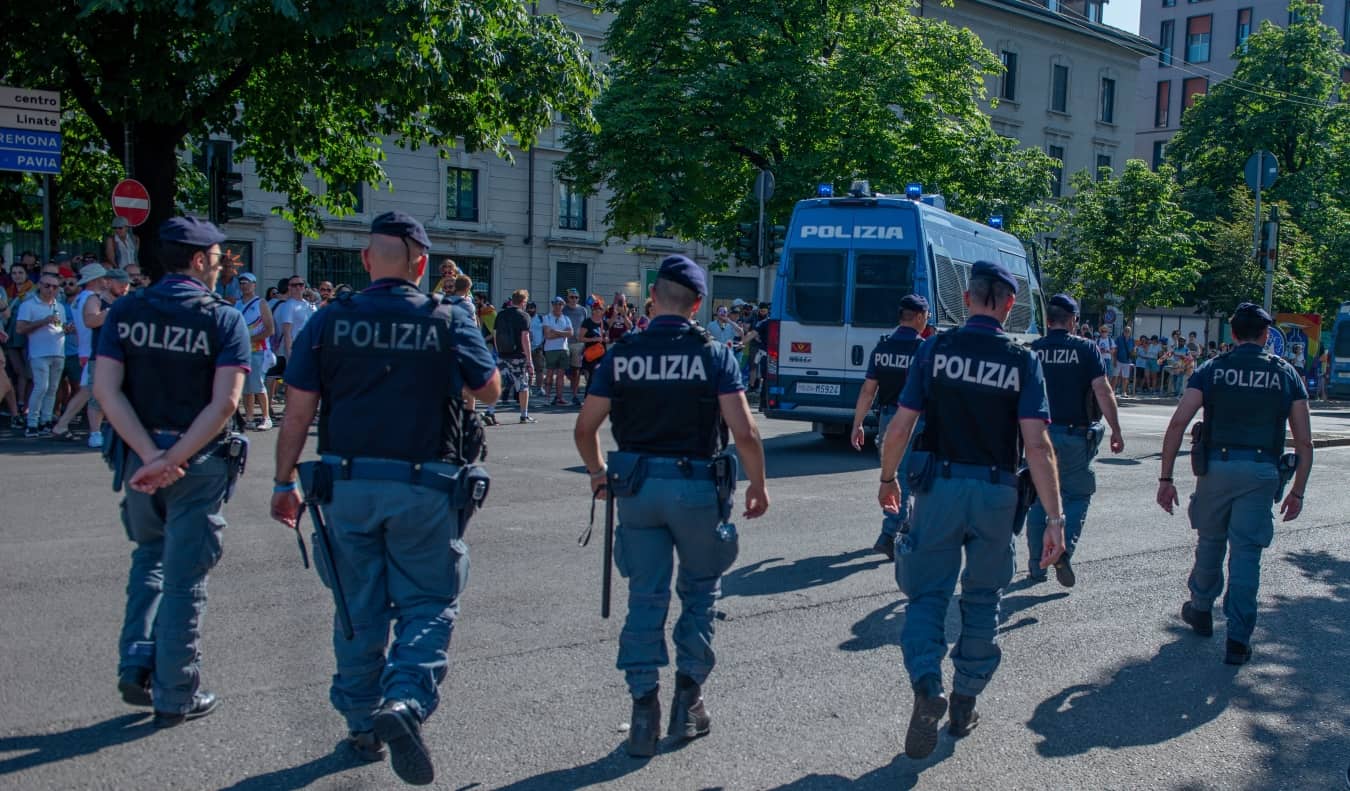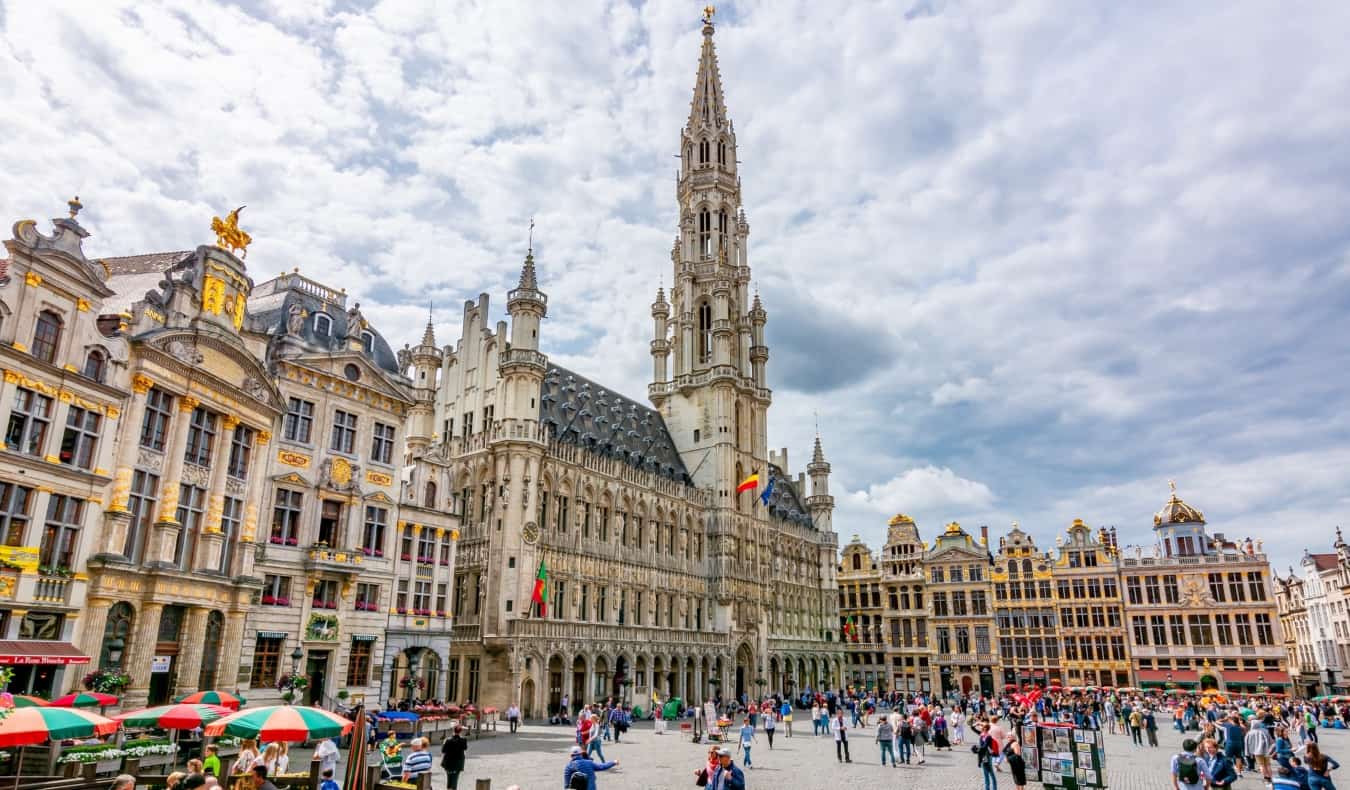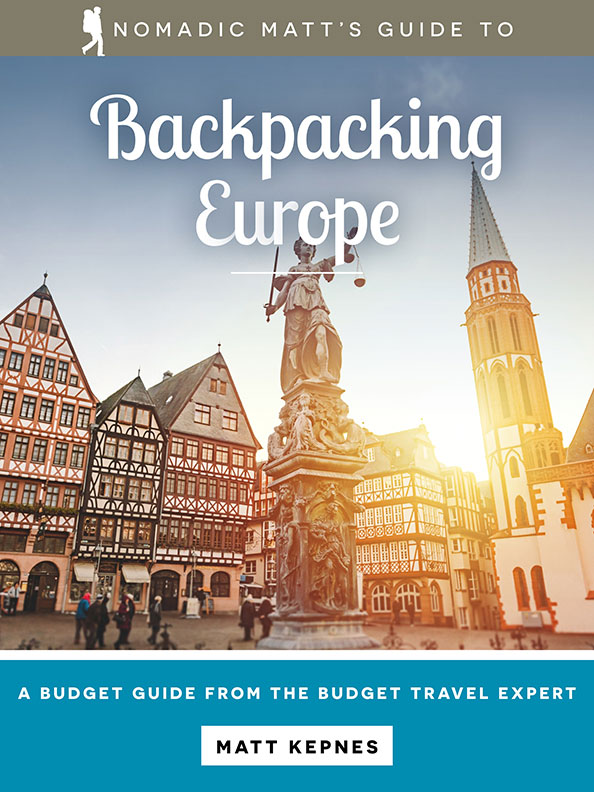
Last Updated: 4/12/24 | April 12th, 2024
When it comes to travel, safety is usually the primary concern of travelers when they are picking a destination. Because of the ongoing war in Ukraine (as well as the current conflict in the Middle East), I’ve gotten many emails asking me if Europe is safe to visit.
The questions are always the same:
“Is it likely the war will spread? What about terrorist attacks? Refugees? There are always strikes and protests happening these days. Is Europe safe to visit?”
It feels like there is a lot of uncertainty. I get it. If you watch the news regularly, you’d think the end is nigh. Fortunately, reality isn’t nearly as bleak as the news.
Having been to Europe recently and with plans to continue to visit (as well as a team member who lives there full-time) I can say this:
Europe is safe to visit.
Let me explain why.
Is Europe ACTUALLY Safe?
“If it bleeds, it leads” is the go-to mantra of the news and social media these days. Unsurprisingly, the media have done a good job of painting Europe in a negative light. Something happens, they pick up the story and run with it, and it gets amplified and sensationalized. A politician uses it as “proof” of his larger point, it gets amplified again, and then suddenly, a whole continent looks like it’s dangerous and engulfed in flame. (I’m not saying what happens isn’t newsworthy, but we all know 24/7 coverage creates this echo chamber.)
People also end up extrapolating from sensational coverage and assume that what they read is the only thing going on. It’s how biases are formed. It’s why people who have never been to France think “the French hate Americans” or “the French are all rude.”
Or why many Americans still think Colombia is the dangerous narco-state they heard about throughout the 1980s.
Once engrained, these mistaken perceptions are hard to change. (And it’s not just Americans who do this. Every country around the world has conceptions of all the others!)
Combined with all the fake news on the web and how people only seem to absorb that which confirms their preconceptions, it’s easy to see why Europe looks bad.
Europe is no more dangerous (probably even less so) than any city in the US (certainly in terms of gun violence)…or anywhere else in the world.
In fact, 7 of the world’s 10 safest countries are in Europe (compared to the USA ranking 129th). These include:
In terms of terrorism, Europe is safer than it’s ever been.
Statistically speaking, you’re actually probably safer in Europe than in the US, depending on where you live and where you’re visiting! That’s not to say Europe is perfect; it still has its issues, just like any destination. But I go to Europe multiple times every year and can tell you that, as a tourist, you are not in any greater danger than you were years ago.
“But I saw those awful protests in France!” you say.
Well, Europe (especially France) has a long history of protests and riots. While I am not here to start a debate on French integration, the fact is that France has always had an issue integrating immigrants into French society. This has been a source of friction for decades and sometimes erupts into riots, especially in the housing developments on the outskirts of Paris. They also have a strong and active working class which also leads to a lot of strikes and protests.
This is nothing new; the news media are only making it seem like something new because they are trying to tie it to the current refugee situation. There are no roving bands of youths in central Paris and no “no-go zones” in the city!
Not only am I not concerned about safety in Europe, but I’ve also led many group tours around the continent and everyone felt perfectly safe the entire time.
The truth is, statistically, you’re more likely to get hurt in your bathtub than die in a terrorist attack (over 700 Americans die in their bathtub each year!).
I am not denying that there isn’t an increase in terrorist threats around the world or that we shouldn’t be more vigilant.
But you also never know when you could be in a mass shooting, bus accident, car crash, or lightning strike here at home. We’re petrified of being in a terrorist attack while traveling abroad, but we hardly ever give any thought to getting in a car or the bathtub.
Terrorist attacks are rare and it’s very unlikely the war in Ukraine will sweep across the continent or that Hamas will start attacking European cities. The now-endless media coverage when something happens and the fact that is all we hear about make it seem like they are more common than they really are. Since pretty much only the negative things make the news, we assume that that’s the only thing happening.
Rather than violent crime and terrorist attacks, the biggest thing you’ll have to worry about when visiting Europe is pick-pocketing, which can be rampant in certain places. Even so, by keeping your wits about you and practicing certain safety tips, you’ll be able to protect yourself and avoid incident.
10 Safety Tips for Visiting Europe

1. Be aware of thieves or muggers working in pairs or small groups – The trick of distracting you (for example, someone “accidentally” bumping into you, holding up a map for directions, or a group of kids playing or fighting near you) is often used so that an accomplice can rob you while you’re not paying attention to your belongings. Don’t fall for distractions and keep your guard up.
This doesn’t mean you need to constantly be looking over your shoulder. Rather, it just means to pay attention and be aware of your surroundings when you’re out and about.
2. Keep an eye on your belongings at all times – Pickpockets love to prey on careless tourists, so keep your belongings (especially your smartphone) out of reach at all times. Be especially alert in crowded places near major tourist attractions, markets, or on public transit. Do not leave your purse or bag hanging off the back of your chair while dining in restaurants, especially on the beautiful outdoor terraces that are so common in Europe. It’d be all too easy for thieves to swipe it without you even noticing!
3. Be mindful of your money – Likewise with your money. Don’t carry every euro you have in your wallet or pocket. Spread it around (some in your wallet, some in the hotel safe, some in your backpack), so that if someone steals your wallet, you’ll still have money elsewhere.
4. Be careful when using ATMs – Only use ATMs inside a bank. Robberies are much more common at outdoor ATMs, and skimmers can be placed on outdoor ATMs (to steal your PIN). To stay safe, only use indoor ATMs.
5. Carry a photocopy of your passport with you – This is a no-brainer for anyone who travels overseas. Put your real passport away in the lockbox provided by your hotel or hostel and carry around a photocopy or a digital version on your phone or in your email.
6. Never leave your drink unattended – This is another universal safety tip, but especially if you’re backpacking and partying in Europe. Drinks can be spiked at any moment, so always keep yours close, or hand it to someone you trust if you need to.
7. Install the Prey app to your phone and laptop – If your devices get stolen, you’ll be able to track them and remotely turn on your camera to photograph the thief (you can also wipe the data and message the thief too). It costs just $1.10/month.
8. Download Google Maps & Google Translate – Download maps of where you are visiting for offline use. That way, you can access them even if you don’t have Wi-Fi or mobile data. Be sure to bookmark your accommodation on the map, as well as other important locations (nearest hospital, embassy, etc.)
Additionally, download the local language via Google Translate. That will allow you to translate things without data/Wi-Fi as well.
9. Follow your local embassy on social media – If you use Twitter, follow your country’s embassy in the destination country. It will not only mention important local events and holidays but, should a situation arise, also publish updates and information there. Make sure you turn your notifications on so you don’t miss anything important.
Following local news companies on social media is also a good idea, especially if there is a local english-speaking news site/Twitter account. That way, you definitely won’t miss any important happenings.
10. Buy travel insurance – We never think that something is going to go wrong on trips. But it does sometimes — which I’ve learned from experience. I’ve lost luggage in South Africa, had my gear break in Italy, and popped an eardrum in Thailand. I was also knifed in Colombia.
While it’s not fun to think about, bad things can happen while you’re traveling, which is why I never leave home without travel insurance.
I recommend SafetyWing for travelers under 70, while Insure My Trip is the best choice for travelers over 70.
You can use this widget to get a quote for SafetyWing:
For more information on travel insurance, check out these posts:
What About the War in Ukraine?
I’ve had tons of people emailing me recently asking if it’s safe to go to Europe even though there is currently a war going on between Russia and Ukraine. The conflict has been ongoing for years, however, it’s entirely localized in Ukraine. That means the rest of Europe is safe to visit.
Obviously, visiting Ukraine is out of the question (and I’d suggest you avoid visiting Russia as well), but neighboring countries like Poland, Slovakia, Hungary, and Romania are still perfectly safe (just don’t go too close to the border). While the conflict is front of mind for everyone (both tourists and locals), you really won’t notice it in terms of day-to-day events as a tourist. The war is completely isolated to Ukraine, which means you’re free to travel elsewhere in Europe without worry.
What’s the Safest Country in Europe?
While most countries throughout Europe are considered very safe, in terms of numbers, Iceland, Ireland, Denmark, and Austria are considered some of the safest. Other safe countries include Portugal, Slovenia, and Switzerland.
Is Europe Safe to Travel Solo?
Europe is one of the safest places to visit as a solo traveler and is an excellent choice even for first-time solo travelers. I’ve been going there for decades and have rarely encountered any problems. Just follow the tips above, use common sense, and pay attention. Do that, and you likely won’t experience any issues. I feel safer in Europe than I do in the US!
Is Europe Safe for Solo Female Travelers?
If you’re a solo female traveler, Europe is one of the safest regions in the world to explore. While you’ll still want to use common sense (don’t leave your drink unattended at the bar, don’t walk home alone intoxicated, etc.), you won’t need to constantly look over your shoulder here.
Is the Tap Water Safe to Drink in Europe?
The tap water throughout Europe is generally safe to drink (with the possible exception of rural areas and some beach destinations, so always be sure to ask locals about the water when you arrive). Depending on where you’re traveling though, it might taste a bit different than what you’re used to due to higher mineral content.
The best way to improve the taste of your drinking water and ensure that it’s safe to drink is to bring a LifeStraw reusable water bottle. They have built-in filters that purify your water so you don’t get sick. Plus, carrying a reusable water bottle will help you avoid single use plastics and save money in the process, as buying water bottles all the time can add up in Europe!
Are Taxis in Europe Safe?
The taxis in Europe are safe and reliable, though like anywhere, you should always make sure you’re getting in an authorized taxi. You can definitely hail a taxi from the street safely, just make sure you pay attention that the meter is turned on and running properly.
Can You Walk Around Alone at Night in Europe?
While every city will be different, as a general rule, walking around Europe at night is fine. I wouldn’t walk around alone at night intoxicated, and it’s always better to be with a group rather than solo. But, generally speaking, Europe at night is safe.
That said, there are going to be areas of each city that are safer than others. Ask your hotel/hostel staff for advice about this in case there are areas best avoided at night.
I can’t guarantee nothing will happen when you visit Europe. But that applies to any region of the world. However, I can say that the chance of something happening to you is so slim that if you’re afraid of that, then you better be afraid of everything else too.
I get that emotion makes human beings irrational, but don’t live your life in fear of what might happen. If you do, the terrorists win, you lose out on living your life, and we live in a state of perpetual fear and anxiety of those around us.
And that’s no way to live.
Visit Europe. It’s safe. Be vigilant and careful but be even more so in the bathtub as you get ready or in the car on the way to the airport. Those places are really scary!
For more general safety tips, check out this webinar with Medjet all about travel safety:
Get Your In-Depth Budget Guide to Europe!

My detailed 200+ page guidebook is made for budget travelers like you! It cuts out the fluff found in other guides and gets straight to the practical information you need to travel while in Europe. It has suggested itineraries, budgets, ways to save money, on and off the beaten path things to see and do, non-touristy restaurants, markets, bars, safety tips, and much more! Click here to learn more and get your copy today.
Book Your Trip to Europe: Logistical Tips and Tricks
Book Your Flight
Use Skyscanner to find a cheap flight. They are my favorite search engine because they search websites and airlines around the globe so you always know no stone is left unturned!
Book Your Accommodation
You can book your hostel with Hostelworld as they have the biggest inventory and best deals. If you want to stay somewhere other than a hostel, use Booking.com as they consistently return the cheapest rates for guesthouses and cheap hotels.
For suggestions on where to stay during your trip, here are my favorite hostels in Europe.
Don’t Forget Travel Insurance
Travel insurance will protect you against illness, injury, theft, and cancellations. It’s comprehensive protection in case anything goes wrong. I never go on a trip without it as I’ve had to use it many times in the past. My favorite companies that offer the best service and value are:
Looking for the Best Companies to Save Money With?
Check out my resource page for the best companies to use when you travel. I list all the ones I use to save money when I’m on the road. They will save you money when you travel too.
Want More Information on Europe?
Be sure to visit our robust destination guide to Europe for even more planning tips!

